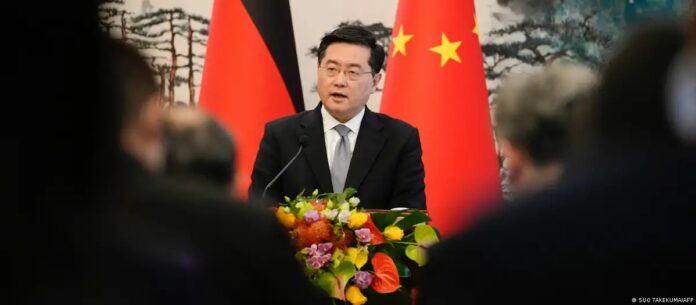As of Wednesday, China’s Foreign Minister Qin Gang has been absent from the public eye for 24 days, marking more than three weeks since his last reported diplomatic meetings on June 25.
At the relatively young age of 57, he became one of the youngest foreign ministers in Chinese history when he assumed office in December. He was, at the time, widely regarded as a trusted confidant of Chinese President Xi Jinping.
His disappearance has brought up difficult questions for Beijing, both inside and outside of China.
Beijing silent on Qin’s fate
Qin’s absence was only officially addressed for the first time last week when the Foreign Ministry announced that he would not be attending the ASEAN foreign ministers’ summit in Indonesia for “health reasons.”
Beijing instead sent its top diplomat Wang Yi — Qin’s predecessor who also ranks above him in the hierarchy of the Chinese Communist Party (CCP) — to take part in the meetings.
But China’s Foreign Ministry has faced repeated inquiries about when Qin will return to his post. Spokesperson Mao Ning responded on Monday that she had “no information” to provide and that China’s “diplomatic activities were continuing as usual.”
On Wednesday Chinese ambassador Xie Feng was also asked if Henry Kissinger, the former US secretary of state who is currently visiting Beijing, had met with Qin. But Xie’s non-answer failed to clear things up.
“Well, let’s wait and see,” Xie said, without further elaboration.
China’s diplomatic scramble
It is not uncommon for prominent figures in China to suddenly vanish from the public eye, only to reemerge later without clear explanations. Even President Xi himself once disappeared for a fortnight shortly before taking the top job as leader in 2012.
But Qin’s situation is quite unusual due to his position and the timing of his absence, according to analysts.
“As Chinese Foreign Minister, he needs to appear frequently on the international stage, especially at a time when China’s diplomatic schedule is extremely full,” Deng Yuwen, a former editor for a Communist Party newspaper who is now a current affairs commentator in the US.
Facing a slower-than-expected economic recovery after the easing of COVID-19 restrictions, the world’s second-largest economy is scrambling to reach out and attract investments with a flurry of diplomatic engagements.
Given the circumstances, Wu Qiang, an independent academic and political commentator in China, told DW that the unexplained absence of a high-ranking official like a foreign minister implied “a failure in China’s diplomacy” that could even trigger discontent with the government among domestic companies.
Qin missing from high-level talks
The disappearance of one of the most prominent figures in Chinese political circles has of course also not gone unnoticed outside of China.
A meeting between Qin and the European Union’s top diplomat Josep Borrell had to be postponed. The visit, planned to take place two weeks ago, was called off by Beijing just two days before Borrell’s arrive, according to Reuters.
Qin also missed out on high-profile talks this month between Chinese and US officials, including US Treasury Secretary Janet Yellen and Climate Envoy John Kerry.
When asked whether Qin would join Wang Yi at the BRICS summit next month in South Africa — as well as visits to Nigeria, Kenya and Turkey — Foreign Ministry spokesperson Mao said that there was “nothing more to add” to the line-up for Wang’s trip.
Prominent in his absence
The mystery of Qin’s whereabouts and status have sparked fevered speculation among diplomats, political analysts and even the Chinese public.
On Weibo, China’s Twitter-like platform, video clips of Mao responding to the questions related to Qin’s schedule received tens of thousands of views.
“Something definitely went wrong,” one user commented under the clip. “Most likely [he is] under investigation,” another added.
Overseas Chinese commentators have also floated theories that Qin’s troubles might be related to an alleged affair with a TV presenter. But as the former Chinese newspaper editor Deng told DW, the lack of evidence for this theory means this will likely remain just speculation.
Beijing’s ‘unpredictable’ leadership
However, many believe that whether Qin will reappear “safely” is no longer the point. The unfolding episode itself already speaks volumes about the current state of Xi’s rule.
Wu, the political commentator in China, told DW that the abrupt disappearance of Qin “is highly troublesome” since it indicates that Beijing may be moving closer to a “mystical and unpredictable” form of autocratic leadership.
When Xi Jinping started his unprecedented third term as China’s president, he surrounded himself with loyalists to form a strong political inner circle, with Qin being counted among them.
Qin was appointed to his role after serving less than two years as China’s ambassador to the US. Beijing had hoped he would play a crucial role in “stabilizing its relations with Washington,” Wu said.
But these expectations were not met as reports of a Chinese spy balloon over the US caused tensions between the two powers. Disputes over chip export controls imposed by the US and its allies have only exacerbated the situation. For Wu, this is perhaps the reason for Qin’s “tragic” situation.
But for Deng, if there is still no sight of Qin by the end of the month, then “I can almost conclude that his political career has come to an end.”









































